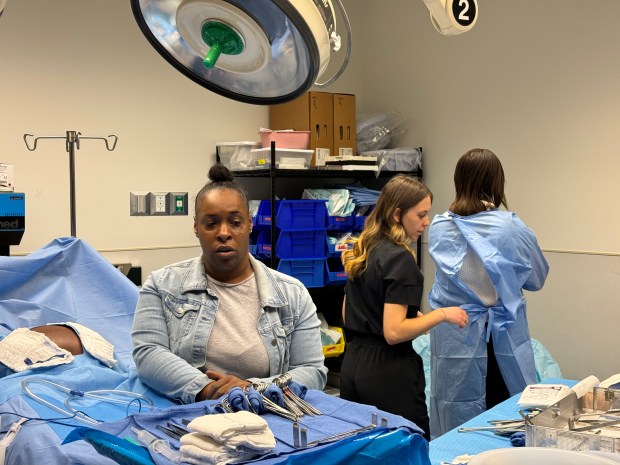Students from Portage, Chesterton and Washington Township high schools got a better sense of healthcare career opportunities during a visit to Ivy Tech Community College’s Valparaiso campus on Wednesday.
The Healthcare 360 program was organized by Portage Economic Development Corp. Ivy Tech Chancellor Aco Sikoski, a board member, said the economic development agency and Ivy Tech also partner in programs for manufacturing and construction careers.
“We are excited to show the high school students in our service area, juniors and seniors, the programs in this area,” he said.
Not only do the students get to see Ivy Tech’s programs and state-of-the-art facilities but also what various jobs are likely to pay and how affordable the training required for them will be, Sikoski said.
Andy Maletta, executive director of Portage Economic Development Corp., said the program began six or seven years ago with tours of area hospitals as well as Ivy Tech. The COVID-19 pandemic changed things. Now the full day is spent at Ivy Tech. “Actually, it’s worked out better because kids get to see more,” he said, rather than spending so much time on the bus from one location to another.
Portage students have been participating all along, but Maletta’s agency decided to invite other schools to participate. “It’s a program we’re proud of. We brag about it all the time,” he said.
“I think it’s a very good experience,” Chesterton High School sophomore Taylor Shvedas said. “I learned that vaping is very bad,” with four months of vaping having the same adverse impact on health as one year of smoking.
Classmate Peyton Moskalick agreed. “They showed us a jar of tar, and the building on it was just insane.”
The jar, which originally held coffee, was filled with tar from one year of smoking.
Learning about performing cesarean sections and maintaining a sterile field was also interesting, Moskalick said. “They gowned us and showed us where to keep our hands,” she said. “This will open a lot of eyes.”
“C-sections are fun,” Ivy Tech surgical tech student Brandy Smith told the students. “I did my first twins last week.”
“Once that baby’s out, everything goes fast,” she said.
Smith, of Hammond, said being a surgical tech is so interesting it doesn’t seem like work to her. “Nothing is the same as looking into an actual body. Everybody is different. Every procedure is different.”
Marsha Ericks, surgical tech program chair at Ivy Tech, watched as the high schoolers tried their hand at a laparoscopic surgery simulator. “If you play with computers, you’re probably pretty talented at this,” she said.
“It teaches you that eye-hand coordination,” Ivy Tech student Maddy Doot, of St. John, said.
Ericks said the exposure to a wide variety of healthcare careers is a good experience for the high schoolers. “It’s a great introductory window for them to see what we offer here at Ivy Tech,” she said. “Nursing’s not for everybody.”
Yvonne Rodriguez, program chair for paramedic services, said students can expect to be hired quickly. “We just had a recruiter in here this week,” she said. “There’s a nationwide shortage.”
It’s a familiar story for healthcare fields, Ericks said, with jobs readily available.
Pharmacy technicians are in such high demand that the state’s Next Level Jobs program will pay the tuition for qualifying students, said Mindy Rouse, administrative for the School of Health Sciences at Ivy Tech. “The sky’s the limit with this degree.”
Nursing department chair Sarah Darrell watched as high school students toured the nursing simulation lab. “We’re able to put students in real-life situations and do no harm to people,” she said. As she talked, one of the mannequins was sweating and crying.
“They talk, they sweat, they have blood pressure. Their pupils even dilate,” Darrell said. One even gives birth.
“We use virtual reality. We use augmented reality,” she said. In one scenario, the mannequin was made up to look extensively bruised and battered. That was to portray a suicidal patient who crashed a car, something a nurse might deal with in a hospital setting.
Viki Pavlakic, department chair for medical assisting, explained her students go on to help in doctor’s offices, gathering vital statistics, drawing blood and administering immunizations.
“You get to establish that rapport with your patients,” she said, watching the results of treatment. “I like the one-on-one working with my patients.”
Lorna Marcus, chair of the healthcare specialist department, trains certified nursing assistants. To help them understand the patient experience, she has students try on Vaseline-covered glasses to see what poor vision is like. They also brush each others’ teeth to gain more compassion and understanding of what their patients experience.
Helping patients with dementia is a rapidly growing field. Some of the students take the eight-week course to assist family members.
Arin Koontz, respiratory director at Northwest Health-Porter, talked about the effects of smoking and vaping.
“You should see what the lungs look like when you’re in surgery. They’re black. They’re just covered in tar,” Ericks said.
Koontz runs a pulmonary rehab program. “It’s basically physical therapy for their lungs,” she said, to improve patients’ quality of life.
Doug Ross is a freelance reporter for the Post-Tribune.



